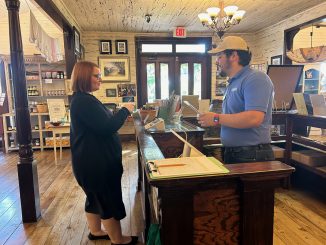
A measure to significantly alter how the House elects its speaker, the chief presiding officer in the lower chamber, was passed with no advance notice and no debate during the waning moments of the recently-adjourned regular session.
But don’t expect it to take effect any time soon — or ever, really.
With less than two minutes remaining in the session on June 11, the day of final adjournment, the House voted on a motion to both suspend its rules and simultaneously adopt 10 different resolutions, including the one addressing how the speaker should be elected in future terms.
While some in the House were unaware that a vote was even taking place, Speaker Chuck Kleckley, R-Lake Charles, managed to say “without objection” — after asking the body if anyone opposed the procedural move — with enough certainty that those paying attention believed they deal was done.
They were wrong. And it wasn’t until later that staffers discovered the maneuver had occurred after the session’s 6 p.m. deadline, according to House Clerk Butch Speer.
Few, including Speer, can remember the House ever lumping together so many resolutions for such a vote. And since it came during the session’s final moments, in a duration of time that could only be counted in seconds, lawmakers were unable to investigate the resolutions they were being asked to vote on and many seemed unaware there was even an opportunity to object.
Most of the resolutions, HR 219 through HR 226, were commendation, condolence and recognition measures — meaning they were largely ceremonial. But the others were substantive resolutions that some lawmakers would have surely wanted to debate.
Most notably, HR 228 by Rep. Jeff Arnold, D-Algiers, would have allowed for a secret balloting process for nominating a speaker of the House candidate, similar to what was passed by the Senate this session.
HR 229 by Rep. Katrina Jackson, D-Monroe, was also part of the package that didn’t pass. It would have directed the state nursing board to make “limited exceptions” to the 80 percent licensure examination passage rule.
While unintentional — Kleckley was working under the assumption that the House had enough time left on the clock — it underscores the complaints that good government groups and others have voiced about the hectic pace of a session’s final moments.
Usually the problems or oversights occur on the final day when compromise bills emerge from negotiations between House and Senate members, a process known as conference committee. Often several pages long, many lawmakers contend there’s not enough time on the session’s final day to thoroughly review such reports.
Rep. Julie Stokes, R-Kenner, said she working on legislation for 2016 that would limit what kind of proposals can be voted on when a session has entered its final day.
Another paycheck protection bill planned
The biggest and loudest legislative floor debate of the session that never actually happened involved Rep. Stuart Bishop’s paycheck protection legislation. It would have prohibited union dues from being deducted from public payrolls.
Before it was parked, the bill had all the makings for a slugfest, with national interests ready to spend money and lobbyists being pulled in on both sides. But it didn’t have the votes on the House floor and the policy brawl was avoided.
However, Bishop, R-Lafayette, said he has begun drafting a new version for the 2016 session, should he be re-elected. “It’s going to be House Bill 4 next year,” he said, referring to the number made available for the first bill filed in a session. “I’m already working on it.”
Majority whip endorses Landry
House Majority Whip Steve Scalise of Metairie, one of the most influential members on Capitol Hill, endorsed former Congressman Jeff Landry on Monday morning in his bid for attorney general.
Calling Landry a “fighter,” Scalise said Louisiana voters should remember that today’s major policy fights begin on the state level.
“He is not only a strong conservative,” Scalise said of Landry, “but he’s someone who shares in Louisiana values and knows what is at stake.”
Landry, a Republican like Scalise, said “our campaign is about protecting freedom, families and state law.”He’ll face incumbent Attorney General Buddy Caldwell on the fall primary ballot. Prosecutor Marty Maley is also running.
When Vitter surfaced this session
In the past, U.S. Sen. David Vitter could be counted on to become an outside player in any given session, inserting his opinions through press releases and personal appearances. But as a candidate for governor, Vitter seemed to steer clear of the 2015 session.
Except, that is, during the session’s final days earlier this month when lawmakers attempted to advance HCR 15 by Rep. Jack Montoucet, D-Crowley, to suspend for one year all of the state’s sales tax holidays.
When the resolution was brought up in the Senate on June 6, when it was returned to the calendar at the author’s request, senators started pointing out the influence Vitter was throwing around on the issue. In particular, Vitter wanted senators to protect the state’s Second Amendment Sales Tax Holiday for firearm purchases.
Vitter sent an email to lawmakers, writing that the resolution “would likely have a very dramatic negative impact on Louisiana gun and sportsmen stores in particular with very little additional revenue produced from the suspension of that particular sales tax holiday.”
The timing is worth nothing. Vitter held a campaign event with Gun Owners of America in north Louisiana just days prior to the Senate floor hearing. A campaign spokesman said the issue was brought to the senator’s attention while touring local gun shops in conjunction with the event. Montoucet said he saw the merit in Vitter’s argument, but made the decision on his own.
“I didn’t pull the bill because of David Vitter,” said Montoucet. “I did it because it was the right thing to do.”
Concerns grow for some pro-tax Republicans
Some Republican lawmakers who voted in favor of tax increases this session are already worried about business interests and conservative activists recruiting opponents in their districts. But what about the Louisiana Republican Party?
“I’m sure everyone had a good reason for doing what they did,” said Chairman Roger Villere. “But the party believes in smaller government and less taxes. The Republicans in the Legislature who supported increasing taxes should have looked at the budget more carefully for different ways to address the deficit.”
Villere added, “We’re not going to recruit candidates to run against them, but there are definitely some Republican seats that are vulnerable. But those Republicans made themselves vulnerable. We tried to visit with them during session, but they made their own decisions.”
They Said It
“I cannot accept cash in public.”—Senate President John Alario, R-Westwego, opening a gift from colleagues on the Senate floor“Don’t take this the wrong way, but I was six years old when you came to this Capitol.”—Sen. Sherri Smith Buffington, R-Shreveport, to Alario





Be the first to comment